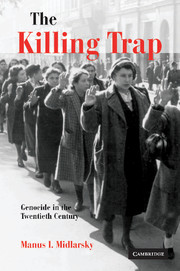Book contents
- Frontmatter
- Contents
- Preface
- PART I Introduction
- PART II Explaining perpetrators: theoretical foundations
- PART III The theory applied
- PART IV Victim vulnerability: explaining magnitude and manner of dying
- PART V Exceptions
- 15 A dog of a different nature: the Cambodian politicide
- 16 Dogs that didn't bark I: realpolitik and the absence of loss
- 17 Dogs that didn't bark II: affinity and vulnerability reduction
- PART VI Conclusion
- References
- Index
16 - Dogs that didn't bark I: realpolitik and the absence of loss
Published online by Cambridge University Press: 22 September 2009
- Frontmatter
- Contents
- Preface
- PART I Introduction
- PART II Explaining perpetrators: theoretical foundations
- PART III The theory applied
- PART IV Victim vulnerability: explaining magnitude and manner of dying
- PART V Exceptions
- 15 A dog of a different nature: the Cambodian politicide
- 16 Dogs that didn't bark I: realpolitik and the absence of loss
- 17 Dogs that didn't bark II: affinity and vulnerability reduction
- PART VI Conclusion
- References
- Index
Summary
In order to establish valid causal inference, instances must be found where genocide might be expected to occur, but did not. Theoretically, the national experience of loss and the demands of imprudent realpolitik, especially unnecessary risk minimization, are suggested to lead to genocide. If even one of these explanatory components is absent, then genocide also should be absent. The following two chapters explore these themes.
In this chapter, I argue that the absence of loss may be sufficient to avert genocide. Thus, the Bulgarian and Finnish experiences of territorial expansion at the start of World War II are contrasted with the territorial loss and contraction experienced by the genocidal and perpetrating states examined in the preceding chapters. Specifically, the pre-genocide histories of Germany, Austria, the Ottoman Empire, the Hutu-led Rwandan state, Italy, Vichy France, and Romania entail the experience of loss, while those of Bulgaria and Finland are associated with gain. At the same time, the genocidal and perpetrating states were complicit in the mass murder of their own citizenry, while Bulgaria and Finland refused to enter that abyss. Germany, Austria, Italy, Vichy France, and Romania also demonstrated very different behaviors before and after their loss experiences.
In chapter 17, the second chapter treating instances in which potential genocide did not occur, I examine the importance of the affinity condition in preventing genocide. That is, even when other facilitating conditions exist, the presence of affine populations or governments (ethnoreligiously similar or ideologically sympathetic) serves to diminish the probability of genocide.
- Type
- Chapter
- Information
- The Killing TrapGenocide in the Twentieth Century, pp. 325 - 334Publisher: Cambridge University PressPrint publication year: 2005



